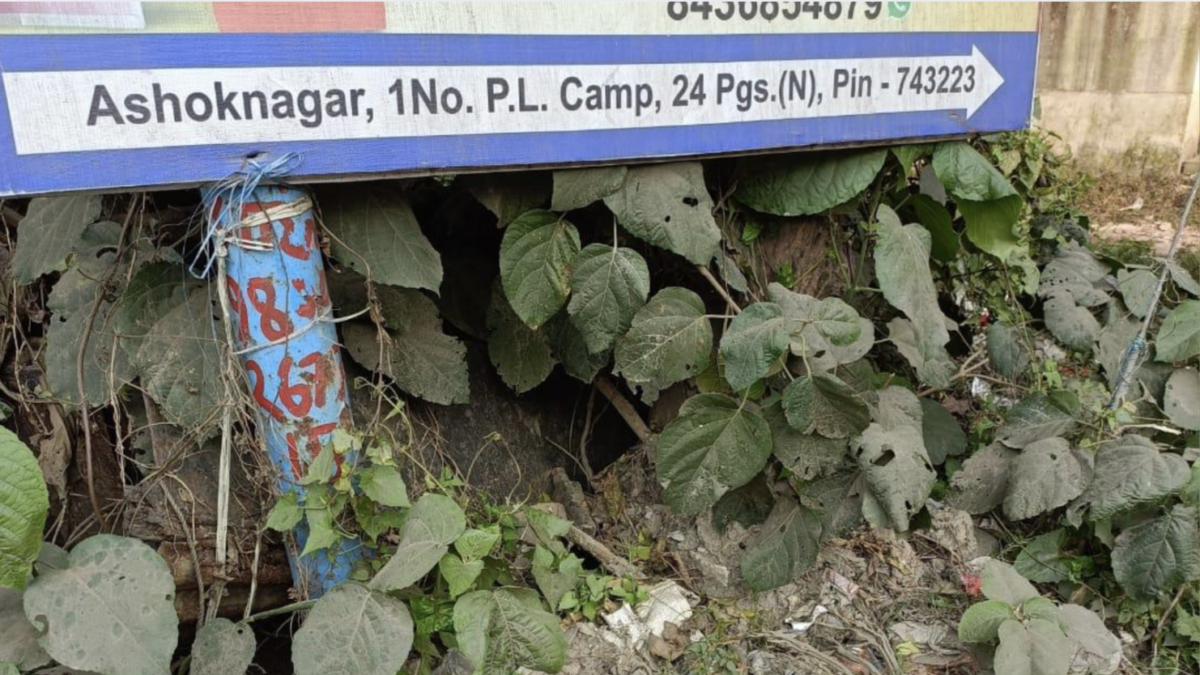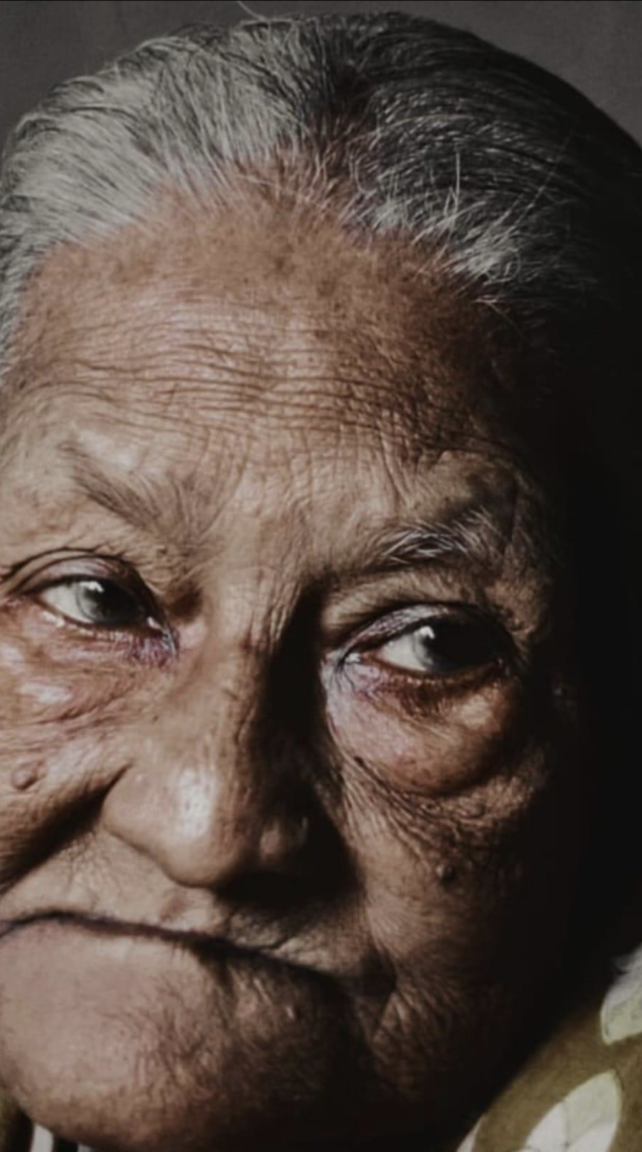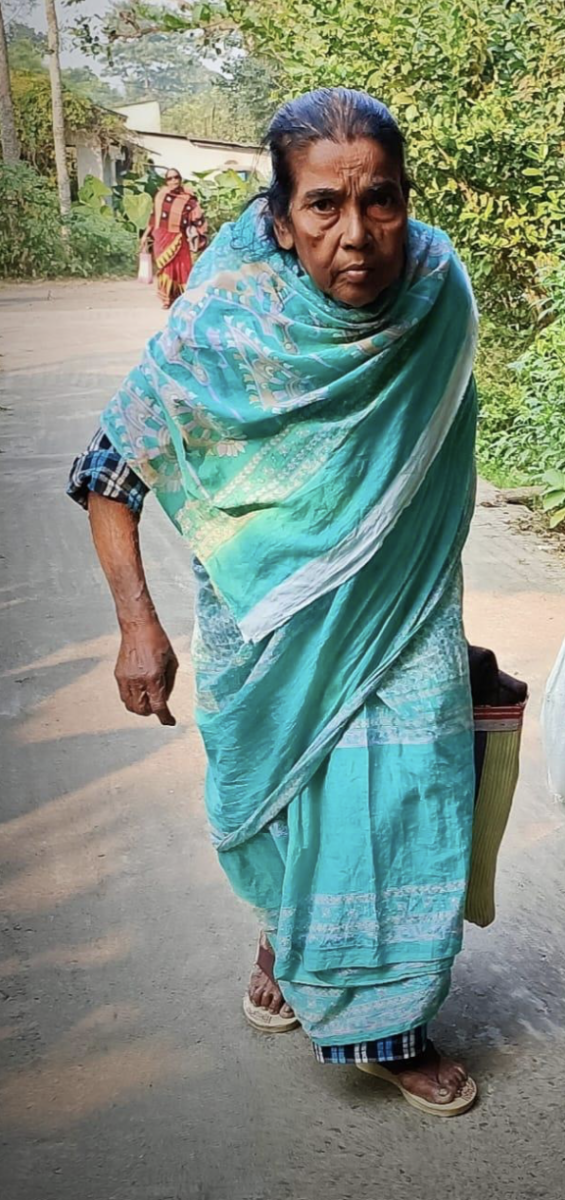A Permanent Struggle for the ‘Orphans’ of Bengal Partition
Ashoknagar: Born in present-day Bangladesh, Usharani Das was separated from her parents and grandfather while fleeing from communal violence. Rescued by her uncle, she was brought to India and left in what is known as a permanent liability (PL) camp.
‘Permanent liability’ is how officials term the refugees living in these camps, but locally, they are called the ‘anatha’ or orphans. Seventy-seven years since the partition of India, seven of these rehabilitation camps set up for refugees from erstwhile East Pakistan continue to house around 400 people in West Bengal.
"I lost everything and ended up in this orphanage," says Usharani, one of the residents in Ashoknagar Permanent Liability Camp in North 24 Parganas district of West Bengal. She is 104 years old now.

A sign board directing towards Ashoknagar PL camp. Photo: Joydeep Sarkar
Watching the news about the unrest in Bangladesh, she says "Please tell the leaders of both countries to stop fighting over religion. Many people will suffer like me if this continues. We had homes, families – everything. Why would anyone want to lose their country and everything they have? What is the point of this fighting?"
Spread over 17 acres of land, the Ashoknagar camp used to be a military barrack constructed for the soldiers of the Allied Forces (during the World War II) which was converted into camps for the refugees.
Also read: Building From Nothing: The Agony, Penury and Politics of Bengal's Refugees
Over time, many refugees who were initially placed in these PL camps on losing their families became impoverished and rootless. So, women like Usharani were given the task of spinning cotton, a lifeline that still sustains her alongside the monthly allowance and ration doles received from the government. They used to supply their product to government hospitals and other departments.
However, these facilities have fallen into disrepair now.
The camp itself, once a refuge for thousands fleeing East Pakistan, is now overgrown with weeds and trees. A government office somehow operates within the colony.
"In the 1960s, women separated from their families used to receive a monthly allowance of Rs. 4.4, along with free ration of rice, dal and atta, and three sets of clothes annually. The allowance by the state government has now increased to Rs. 2,000. There are 13 people alive here,” says Kebal Mallick, the state government employee in charge of the camp.

Usharani, a 104-year-old resident of Ashoknagar. Photo: Joydeep Sarkar
Despite decades of displacement and hardship, Usharani and many others still yearn for their homeland, a mere 100 kilometres away but one they will never see again. The haunting memories of her lost family and the trauma of displacement continue to linger.
However, the struggle to settle down following brutal displacement also made women like her more independent and self-reliant.
Prior to displacement, they were typically sheltered within the confines of their home, largely isolated from public life, but the partition thrust them into the public sphere, shattering their traditional seclusion.
Their lives were further destabilised by their separation from male family members who previously served as the primary protectors. With the loss of this male guardianship, the patriarchy that had traditionally governed their lives began to lose their significance.
“The dominance of patriarchy became futile – at least temporarily – under the forces unleashed by the Partition, a process shaped predominantly by male-driven politics, beyond the control of individual patriarchs. The necessity of survival – both for themselves and their families – drove them to exercise agency in ways previously unimaginable within their traditional societal framework,” observes Dr. Anasua Basu Ray Chaudhury, co-author of 'Caste and Partition in Bengal', who is also an expert on forced migration and women in conflict zones.
On citizenship
Since the partition of India, or even before that, many refugees from East Bengal (Bangladesh) settled in West Bengal, with many now residing permanently. They have blended into the mainstream of Indian citizenship.
However, of late, the BJP has stirred emotions by raking up refugee politics, bringing them into the electoral discourse, raising issues related to current events in Bangladesh.
The 1971 census recorded nearly 6 million displaced persons, from erstwhile East Pakistan – now Bangladesh – to West Bengal. This number further increased to 8 million by 1981, according to a report by the Rehabilitation and Resettlement Committee, under the refugee, relief and rehabilitation department.
The refugee, relief and rehabilitation department was formed right after the Partition to address challenges posed by the sudden influx – one at the state level and one at the centre.
Also read: After Initial Celebrations, Fear Over CAA Process in Bengal's Matua Community
While the central refugee and rehabilitation department was merged with the home ministry in 1984 under prime minister Rajiv Gandhi, in 2016, the state level department was merged with the land and land reforms department, primarily to allocate land deeds to the refugees.
Initially, sheltered in temporary camps, the Left Front in West Bengal had led a movement demanding rights for these refugees. Due to the political pressure, the Union cabinet approved granting them legal rights to citizenship and land for settlement.

An elderly resident of Ashoknagar PL camp. Photo: Joydeep Sarkar
Since then, the West Bengal government has built 3,000 colonies over the years for these refugee settlers who have migrated before March 25, 1971. They were also given a freehold title deed.
“The central government insists on introducing the Citizenship Amendment Act (CAA) to grant citizenship to refugees, reflecting its religious agenda. Refugees in various temporary settlements are being labelled as infiltrators, and they are not willing to accept it. Modi has stalled the approval of 1,800 new colonies proposed during the Left Front era,” says Madhu Dutta, General Secretary, the United Central Refugee Council.
On the other hand, Dutta says, “The state government is offering only possession rights instead of land rights to long-term settlers, including those on railway land, to garner support ahead of elections. We are demanding legal rights for the refugees.”
Dipak Sengupta, a booth president of Trinamool Congress, who lives in Ashoknagar, says, "I live in a house allocated in my aunt-in-law’s name. Mamata Banerjee has given me papers stating that pattas (land deeds) will be given to 69 families here, and the paperwork is ready."
“The pattas being distributed in all areas comply fully with the established rules. Chief minister Mamata Banerjee is personally overseeing this department. As a result, the existing problems will be resolved quickly,” says Chandrima Bhattacharya, the Minister of State for Land and Land Revenue, West Bengal.
Meanwhile, the BJP and TMC have been engaged in a war of words over refugee rehabilitation. Political disputes are a daily affair in West Bengal but for these displaced women, the struggle for permanent land rights amid political tensions and fear of CAA implementation, creates anxiety as they continue their lives in the refugee camps.
The sun beats down on the camp as a small group of elderly residents return, carrying blankets distributed by the government every other winter. Their apprehension grew when they noticed unfamiliar faces.
“Are you here to check for the CAA? We have resided here since the partition,” one of them asks anxiously.
The elderly women were hesitant to reveal their names, their fear palpable.
"At this age, where will they take me next? How many times must I bear this trauma of displacement?" one of them asks.
Translated from Bangla by Aparna Bhattacharya.
This article went live on January sixteenth, two thousand twenty five, at zero minutes past four in the afternoon.The Wire is now on WhatsApp. Follow our channel for sharp analysis and opinions on the latest developments.




